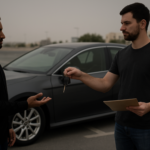

Can Used Car Buyers in Abu Dhabi, or any Emirate in the UAE, identify if the car was imported from the Registration card (Mulkiya)?
The used car market is vibrant and ever-changing. Every day, countless vehicles exchange hands, with some being GCC specs cars that were sold here through the local dealers in UAE and others imported. For used car buyers in Abu Dhabi, it’s crucial to know the difference. Being able to identify whether a car is of UAE GCC specs or imported can be a significant determinant in your buying decision. The key to this information lies in a document most are familiar with, but perhaps not entirely knowledgeable about – the Mulkiya.
In this blog post, we aim to assist used car buyers in Abu Dhabi to determine the origin of the vehicle they are interested in purchasing using the details provided on the mulkiya. So, let’s dive right in!
What is a Mulkiya?
The Mulkiya, or vehicle registration card, is a cornerstone document in the UAE. It verifies a vehicle’s legal standing, registration, and ownership details.
Why is the Specs of the Car Important ?
For used car buyers in the UAE, it’s vital to understand the significance of GCC spec cars. Tailored for the region’s climate and regulations, they offer durability and compliance. Conversely, imported vehicles may lack these adaptations, leading to increased upkeep and performance issues over time. Additionally, many U.S. spec cars in the UAE are salvaged from accidents or floods, posing safety risks and unexpected maintenance burdens. Prioritizing knowledge of a car’s origin is paramount to making informed purchasing decisions and avoiding potential hazards.
How to Identify the Car’s Origin Using the Mulkiya?
For used car buyers, understanding a vehicle’s history is crucial. One key indicator is the gap between the car’s manufacturing date and its first registration date in the UAE. For example, a car manufactured in 2015 but first registered in Abu Dhabi in 2018 likely indicates it was imported. However, this is not always conclusive, as registration dates can change when cars are transferred between emirates.
Additionally, used car buyers should inspect the vehicle registration card (Mulkiya) for details such as the engine number. If the engine number field states “NIL,” this confirms the car is imported. Knowing these details helps used car buyers make more informed decisions and avoid potential issues associated with imported vehicles.
Can a car be imported, but still GCC specs?
Yes. If the car was imported from Saudi Arabia, Oman, Qatar, or any other Gulf country. In this case the car will have a sticker or metal label that says that this car is adhering to the GCC standards. Commonly found on the B-pillar—specifically, the panel between the front driver’s door and the rear left door. This is a safer option for any used car buyer than buying a U.S Specs car. The car is designed to cater to the needs and conditions of the UAE, including the intense heat and local regulations. However, the Manufacturing Warranty will not be valid on some makes and models if the car was moved from one country to another.
Final Considerations:
Making informed decisions is crucial for used car buyers in Abu Dhabi. Understanding the Mulkiya (registration card) and the specific details of car specifications is key to getting the best value and ensuring a seamless car ownership experience.
Before finalizing any purchase, it’s vital for used car buyers to have the vehicle inspected by a trusted mechanic. This step can help uncover potential issues and ensure the car is in good condition.
For ongoing tips and expert advice tailored specifically for used car buyers in Abu Dhabi and the wider UAE, make sure to regularly check our blog at iCarsU.com. We provide the latest updates and insights to help you make the best choices in the used car market.
Risks of Buying U.S. Imported (American Specs) Cars
Check Accident History of Cars
Add a comment Cancel reply
Categories
- Abu Dhabi (2)
- Accidents (3)
- Car Registration (1)
- GCC Specs (3)
- Imported (3)
- Sell a car (1)
- Specs (1)
- Uncategorized (28,023)
Recent Posts
We work by appointments only. Please call or text to arrange an appointment first
Service Areas: Abu Dhabi (Head Office), Dubai, Sharjah, Ajman, Ras Al Khaimah, Fujairah, Umm Al Quwain.
Westburry Tower, 3rd Floor, Marasi Drive, Business Bay, Dubai, UAE












